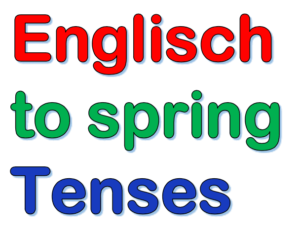Englisch Verb to spring | Zeiten bilden

Die wichtigsten Zeiten für: Englisch Verb to spring | Zeiten bilden
Hier wird das unregelmäßige Verb “to spring” in der Simple Form und Verlaufsform konjugiert.
Weitere Lernhilfen: Test | Weitere Verben
Konjugation vom Verb „to spring“ in der Simple Form
Mit der Simple Form (auch Normalform genannt) drückt man regelmäßiges, wiederkehrende Ereignisse oder Sachverhalte aus. Hier ist das Resultat der Handlung wichtig.
Simple Present | Present Perfect | Will-Future |
I spring | I have sprung | I will spring you will spring |
Simple Past | Past Perfect | Going-to-Future |
I sprang | I had sprung | I am going to spring you are going to spring we are going to spring you are going to spring |
Konjugation vom Verb „to spring“ in den Verlaufsformen
Mit der Verlaufsformen (auch “-ing Zeit genannt) drückt man momentane Abläufe und Handlungen aus, die noch andauern oder lange Zeit dauern.
Present Progressive | Present Perfect Progressive |
I am springing | I have been springing |
Past Progressive | Past Perfect Progressive |
I was springing | I had been springing |
Will-Future Progressive | Going-to-Future Progressive |
I will be springing | I am going to be springing |
